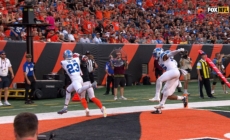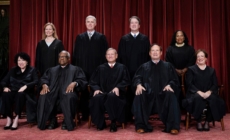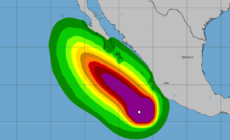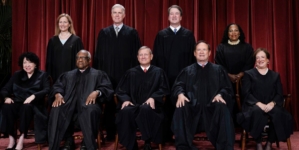-
‘Shut down the Blue Jays’ offense’ – Derek Jeter on how Yankees can overcome 0-2 deficit in ALDS - 5 mins ago
-
Gaza ceasefire negotiations to resume amid new hope for peace deal - 17 mins ago
-
Threats to TikTok workers are traced to L.A. man; standoff follows - 21 mins ago
-
McLaren boss makes strong statement on Norris-Piastri contact - 31 mins ago
-
Ja'Marr Chase makes incredible TD grab as Bengals close gap on Lions - 48 mins ago
-
Kyle Busch Breaks Silence on Crew Chief Change Amid Performance Slump - about 1 hour ago
-
George Springer's 20th career playoff home run increases Blue Jays' lead over Yankees - 2 hours ago
-
Amy Schumer, 44, shows off impressive weight loss on social media - 2 hours ago
-
Supreme Court Kicks Off New Term: What to Know - 2 hours ago
-
Priscilla strengthens into a hurricane in the Pacific. Maps show its path. - 2 hours ago
Attorney Accused of Threatening To Kill National Guard Not Indicted
A federal grand jury in Washington has declined to indict Paul Anthony Bryant, a District of Columbia attorney and Army veteran accused of threatening National Guard members deployed as part of President Donald Trump’s federal crime surge.
The decision, September 9, marks the latest setback for Trump appointee U.S. Attorney Jeanine Pirro’s office, which has faced repeated difficulties in securing felony indictments since the federal takeover of law enforcement in the capital.
Why It Matters
The rejection of charges against Bryant matters because grand juries hardly ever decline to indict, yet several have done so since Trump’s “crime emergency” brought federal troops and prosecutors into Washington. The pattern has cast doubt on U.S. Attorney Jeanine Pirro’s charging strategy and signaled skepticism from local jurors about the surge’s prosecutions.
But Pirro has argued that the trend reflects politics rather than weak cases, she told CBS News September 3, 2025: “The system here is broken on many levels. Instead of the outrage that should be engendered by a specific threat to kill the president, the grand jury in D.C. refuses to even let the judicial process begin.”
The divide underscores the competing interpretations of whether the initiative is faltering on legal merits or facing resistance from District residents wary of Trump’s federal intervention.
Jon Cherry/AP
What To Know
Bryant, a West Point graduate and former associate at Covington & Burling, was arrested on August 24, 2025, after an alleged confrontation with Guardsmen patrolling the 14th Street corridor.
According to a criminal complaint filed in U.S. District Court, Bryant told troops, “These are our streets” and “I’ll kill you,” while also stating he was “strapped,” which soldiers interpreted to mean he was armed.
One Guardsman reported that Bryant slammed his shoulder into him during the encounter.
Metropolitan Police officers later recovered a loaded Glock handgun from Bryant’s waistband, along with additional ammunition and a shotgun from his vehicle. All the weapons were legally registered, and Bryant held a valid concealed carry permit.
Prosecutors charged Bryant with assaulting and threatening federal officers under 18 U.S.C. §§ 111 and 115, as well as with making threats under D.C. law. If convicted, he faced potential sentences of up to 20 years.
Bryant, however, denied wrongdoing, calling the allegations “baseless” through his attorney, who emphasized the absence of body camera footage because National Guard members are not required to wear them.
Magistrate Judge Zia M. Faruqui ordered Bryant released on bond on August 28 despite prosecutors’ request for detention. In court, Faruqui described the government’s filing as “perhaps one of the weakest requests for detention I have seen and something that, prior to two weeks ago, would have been unthinkable in this courthouse.”
On September 9, prosecutors informed the court that a grand jury had returned a “no true bill,” rejecting the felony charges.
The U.S. Attorney’s Office subsequently withdrew its appeal of Bryant’s bond order.

DC Metropolitan Police/Court Evidence
Another Trump Case Stalls: D.C. Grand Jury Declines Indictment
The outcome against Bryant is part of a broader pattern. Since Trump’s August order deploying federal officers and the National Guard to D.C., grand juries have declined to indict in at least eight felony cases brought by Pirro’s office.
While grand jury refusals are rare in federal practice, their frequency in recent weeks has raised questions about the strength of the cases and the attitudes of District residents serving as jurors.
These include matters involving threats against Trump himself and assaults on federal officers—Nathalie Rose Jones (accused of repeatedly threatening to kill President Donald Trump in social media posts, emails, and interviews); Alvin Summers (charged with assaulting a U.S. Park Police officer during a crime emergency); Sydney Lori Reid (accused of assaulting and impeding federal officers, but only charged with a misdemeanor after grand jury refusals); and Edward Alexander Dana (arrested for property damage and charged after threatening to kill both an officer and President Donald Trump)—each grand juries returning no bill, despite the severity of the alleged threats and conduct
What People Are Saying
U.S. Attorney Jeanine Pirro has publicly attributed the trend to what she described as a “politicized jury.” Following earlier rejections, she told CBS News September 3, 2025: “The system here is broken on many levels. Instead of the outrage that should be engendered by a specific threat to kill the president, the grand jury in D.C. refuses to even let the judicial process begin.”
Public defender Elizabeth Mullin, whose client was also cleared by a grand jury after being charged with threatening Trump, offered a different explanation, arguing that prosecutors were pursuing “weak cases that don’t belong in federal court,” adding, “And the grand juries are seeing through it.”
Magistrate Judge Zia M. Faruqui, addressing another case tied to the federal surge, remarked that “I’ve seen things over the past 72 hours that I’ve never seen in federal court,” adding “It feels like some sort of bizarre nightmare.”
What Happens Next
Bryant remains free on bond and is scheduled for a preliminary and bond review hearing, where a judge will decide if there is probable cause to keep the charges alive despite the grand jury’s refusal to indict. Prosecutors could re-present the case to another grand jury, pursue misdemeanor charges that don’t require grand jury approval, or drop the matter entirely, as they have in other surge-related cases.
Source link































